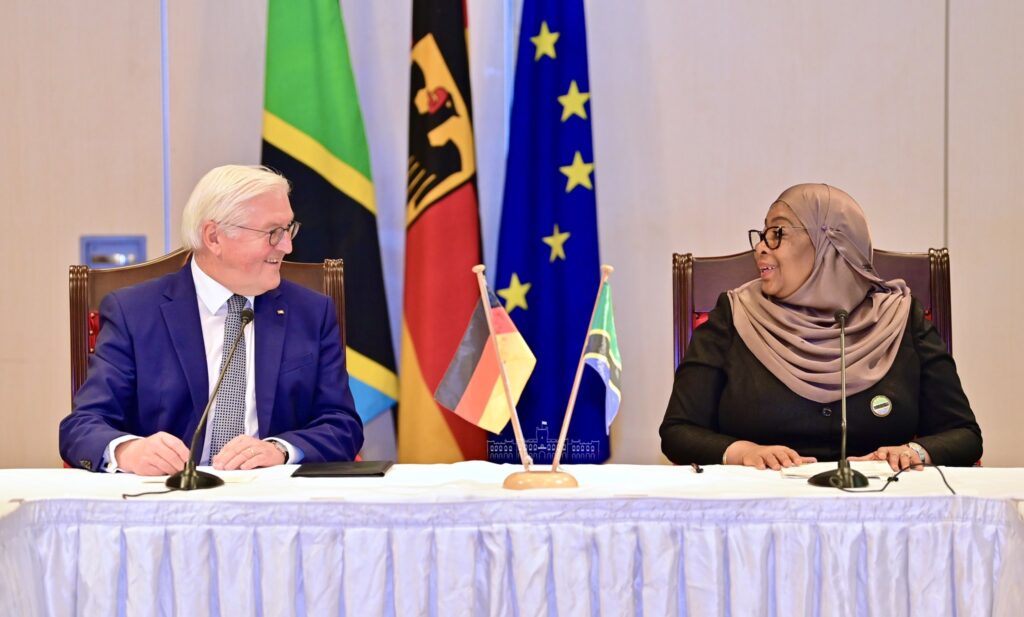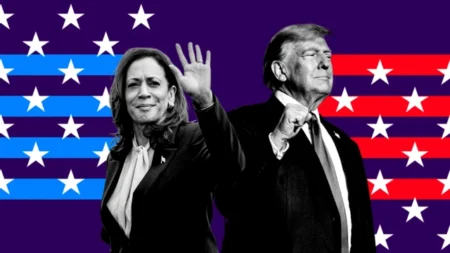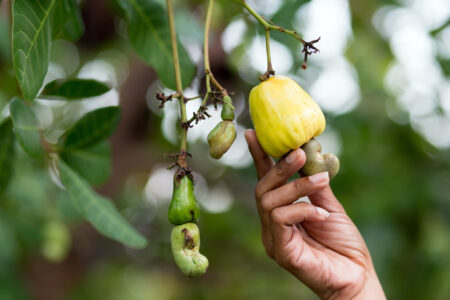- In his business tour, President Steinmeier is leading government officials and investors from over 12 German companies.
- Tanzania expects to see an increase in trade relations with Germany, which has remains in favour of the European country.
- To further cement bilateral ties, German has agreed to return the remains of Tanzanian freedom fighters held in museums in Germany.
Germany’s President, Frank-Walter Steinmeier, is on a three-day state visit to Tanzania. With the high-profile visit, Tanzania expects to see an increase in trade ties with Germany, a relationship that has for decades remained in favour of the European economic giant.
President Steinmeier is leading government officials and investors from over 12 German companies. Tanzania hopes that his visit will serve to strengthen diplomatic, development and bilateral trade relations. Germany and Tanzania have shared a long history given that the later was a colony of the former until 1919.
President Steinmeier pledges investments in Tanzania
During his talks with his counterpart Samia Suluhu Hassan, President Steinmeier pledged increased investment in Tanzania. President Samia made this public during a press conference post their meeting.
Samia said the visit will further strengthen the historic relations that the two countries have shared for over 60 years. She added that German has agreed to return the remains of Tanzanian freedom fighters that are currently held in museums in Germany.
Also Read: EAC, Germany signs US $35 million agreement to boost livelihoods in the region
German President attends a business forum
President Steinmeier attended a business forum that was jointly organized by the German embassy in Tanzania and the Tanzania Investment Center (TIC).
The forum witnessed German investors expressing their increased interest to invest in Tanzania. While no official data on the business deals signed during the meeting has been released, it is anticipated that German investment will be substantial.
Pending the release of the official report from the forum, President Steinmeier also participated in a youth summit. During the summit, he engaged with young business entrepreneurs involved in various start-ups funded by German companies and organisations.
President Steinmeier’s other visits included a tour of the Twiga Cement factory in Dar es Salaam, which operates in partnership with the German company, Scancem International.
“The president will also visit the Maji Maji War Museum in Songea,” said Samia, highlighting the significance of the museum visit in reconciling the shared colonial history.
Also Read: Stanbic Bank, GIZ, partner to accelerate growth of 700 MSMEs post covid-19 pandemic
Balance for Trade: German trade with Tanzania
Germany is among the top 10 foreign investment countries in Tanzania. However, the trade balance remains skewed, with Tanzania importing goods worth $237.43 million from Germany. In comparison, Germany imports goods worth $42.04 million annually from Tanzania.
According to the Observatory of Economic Complexity (OEC), in 2021, Germany exported $204 million to Tanzania. The primary products exported by Germany to Tanzania included aircraft parts worth $18.2 million. Others exports were edible preparations ($17.8 million), and washing and bottling machines ($10.9 million).
The OEC reports that over the last 26 years, Germany’s exports to Tanzania have increased at an annualised rate of 2.64 per cent. They have increased from $104 million in 1995 to $204 million in 2021.
As of July 2023, Germany’s year-on-year exports to Tanzania saw a decline, primarily affected by reduced exports of other chemical final products (67.8 per cent), other prefabricated chemicals (-76%), and Other mineral construction materials (-91.1%). During the same period, there was an increase in Germany’s year-on-year imports from Tanzania.
This year, the top exports from Germany to Tanzania included machinery for food, beverage, tobacco production (€2.29 million), Other food of vegetable origin (€962,000), Measuring and automatic control instruments (€899,000), Pharmaceutical products (€735,000), and Other machinery (€546,000).
Tobacco imports
Similarly, during the same period, the top imports from Germany from Tanzania comprised Coffee (€7.09 million), Other ores and ashes of metals (€5.93 million), Unmanufactured tobacco and tobacco products (€3.27 million), Copper ores (€2.65 million), and Fish and crustaceans, mollusks (€227,000).
In comparison, in 2021, Germany ranked number 5 in the Economic Complexity Index and number 3 in total exports ($1.56 trillion). In the same year, Tanzania was ranked 111 in the Economic Complexity Index (ECI -1.09) and 104 in total exports ($8.56 billion).
The trade balance between the two countries may shift in favor of Tanzania following the current visit by German delegations. German government officials have pledged to increase investment in key economic sectors, potentially leading to increased exports from Tanzania to Germany.
German investment in Tanzania grows
Germany has been involved in international cooperation with Tanzania for over 60 years, President Samia stated during the press conference.
Working in collaboration with various local project partners and the East African Community (EAC), which is headquartered in Arusha, Germany has made significant investments in Tanzania’s business and infrastructure development.
The president mentioned key areas of German investment, including the healthcare sector and technology transfer.
President Samia said her administration is prioritizing the rapid expansion of infrastructure and the manufacturing industry. In this regard, her German counterpart has pledged support for national development through people-centered economic growth.
German investment in Tanzania is facilitated through Deutsche Gesellschaft für Internationale Zusammenarbeit (GIZ). This organisation operates on behalf of the German Federal Ministry for Economic Cooperation and Development.
The primary areas of focus have been to enhance access to healthcare services, particularly for mothers and young children. In partnership with the Ministry of Water, Germany is developing legislation to improve the efficiency of water and sanitation systems.
Transition into renewable energy
GIZ provides guidance to the Ministry and the newly established Tanzania Wildlife Management Authority. It seeks to preserve the country’s major ecosystems, such as the Serengeti and Selous.
GIZ also collaborates with the National Audit Office of Tanzania to support good financial governance. On behalf of Germany, the organization backs Tanzania’s efforts to transition to renewable energy sources and encourages private investment.
It runs various multi-country initiatives to drive income generation and employment opportunities. What’s more, GIZ seeks to enhance the competitiveness of the Tanzanian economy. Some of its initiatives include the Competitive African Rice Initiative (CARI). CARI focuses on assisting smallholder farmers in the rice value chain to enhance their competitiveness and increase incomes.











